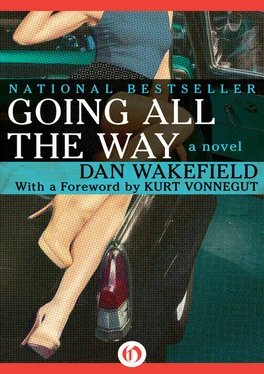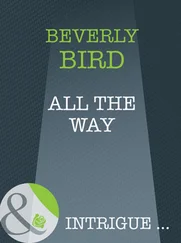“Well,” Gunner said, “it didn’t seem like the time to do it.”
“No,” Sonny agreed.
Gunner said he felt like bashing some golf balls, and Sonny said he wouldn’t mind watching, so they went out to Little America to the driving range. Sonny really couldn’t stand golf. Once, when he was around twelve years old, his father took him out on a dewy spring morning to give him a golf lesson. It was one of those times Mr. Burns was trying to be like a father, but like most of his shy, halting efforts along those lines, it didn’t quite come off. Sonny remembered with a vivid embarrassment how his father curled his hands over his, trying to show him how to grip the club, and Sonny could feel his father’s hot breath on his neck and smelled the sweet mists rising off the tender early morning grass, and he was dizzy with the sadness of it, the fright of touching, the awkwardness of two human beings of the same flesh and blood who didn’t know how to love and were clumsy with fear. Sonny tried, but he never hit one straight ball. His elbows and knees kept popping out at the wrong times, bending when they should have been straight, stiffening when they should have given. After the agonizing hour was over, his father said, “We’ll try it again sometime,” and Sonny said, “Sure, that’d be great,” but neither of them ever mentioned it after that. Sonny wanted to thank his father for the effort, the good intention, but didn’t know how. The words, whatever they were, clung to his throat.
Sonny never picked up a golf club after that—except to play miniature golf on dates with girls—but he got a real charge out of watching Gunner drive balls. It looked like pure pleasure. There was the concentration, the brief, nervous flexing of the knees as the stance was assumed, the swing up and back with the eye never leaving the ball, the crack of the club square on the mark, and the graceful curve of the follow-through as the white dot sailed past the hundred-yard mark, the two-hundred yard, the two-fifty, and sometimes clear into the woods beyond.
“ Go you bastard!” Gunner shouted.
“Great,” Sonny said. “You really clobbered it.”
Gunner drove three buckets of balls while Sonny looked on. By the time Gunner finished all the buckets, the sky had turned that purple color it gets just before real darkness, and the big floodlights of the driving range had come on. Gunner said he could eat a horse but he didn’t feel like going home. Sonny didn’t either. They both called their mothers to say they wouldn’t be home for supper, and went to the Von Burg’s Snack Shop and had the big greasy kind of breaded tenderloins that they seem to make that way only in Indiana, and washed them down with root-beer floats.
Gunner still was restless, and he said he wouldn’t mind buzzing by Ray Sheneke’s place.
“You remember Shins?” he asked.
“Sure, sort of,” Sonny said.
Sheneke wasn’t a jock but he was one of the Big Rods who ran around in that gang at Shortley. He was more the playboy type, a quick, skinny sort of guy who dressed pretty sharp and carried a churchkey on his watch chain so he’d always be ready to open a can of beer. He was always elected Treasurer of everything. Certain guys were always being elected Treasurer, just like other guys were always being elected President of whatever it was they were in. Other guys just voted. Sonny sometimes thought that those things were decided when you were born, like when Ray Sheneke came out of the womb, God looked down and said, “That guy’s Treasurer material,” and so it would be for the rest of his life.
“We were lodge brothers at DePauw,” Gunner said. “He was one guy who seemed to have a brain in his head, when he wasn’t partying. You know, if you got him talking without a lot of guys around.”
Sonny wasn’t sure if he ought to go along to Sheneke’s, but Gunner seemed to take it for granted, so he didn’t say anything. Sheneke had married Patsi Heppenstall and they lived way out north on a fairly fancy new street called Morning Glory Road, off Meridian. The house, a stone ranch type, was a wedding present from Patsi’s folks, and a lot of people were catty about it. Everyone knew that a young couple just starting out couldn’t afford a house like that, and some felt they ought to start out like everyone else in either an apartment or a duplex or one of the older little houses in closer to town like Gunner’s sister Peachie lived in. The feeling was that a young couple ought to work their way up, ought to earn their own house, and that way they’d really appreciate it more. Patsi’s parents took the more controversial stand that you were only young once and you might as well be able to enjoy it instead of having to wait till you were old and tired.
A light was on in the big picture window, and a guy in a chair peered out at the car. The porch light flashed on, and before Gunner and Sonny made it all the way up the flagstone walk, Shins was at the door, waving and grinning.
“Gunner, old bastard, home from the wars!”
“Shins, baby!”
Sonny stood with his hands in his pockets while Shins and Gunner pounded one another around in greeting.
“Hey, Shins, you remember Sonny Burns,” Gunner said.
Sonny stepped forward and Shins, with an uncertain smile, pumped his hand and said, “Right, yeh, how goes it, man?”
“Swell,” Sonny said.
They went inside and Patsi came out from the kitchen, wiping her hands on a dish towel, but when she saw Gunner she dropped it, screamed his name, and threw her arms around him, kicking one leg back in the air like the sexy babes in the movies did when they kissed some guy. She was tall and thin and didn’t have much up front, but her long, curvy legs were generally acknowledged to be the best pair at Shortley during her day. When such things were first being judged and appraised by the guys, the accepted fantasy-desire in speaking of Patsi Heppenstall was “How’d you like to have those goddam legs wrapped around ya— squeezing ,” just as the equivalent fantasy for Sandy Simpson, who was famous for the way she undulated down the corridors, was “How’d ya like to have that great little tail on top of ya— moving? ” These rhetorical questions were answered with moans, wails, grunts, grabs of the cock, and sometimes full collapses to the floor, where the tormented connoisseur would writhe and beat his fists while his buddies howled like mongrel dogs in a midnight alley.
“Hey, Pats,” Gunner said, disentangling himself. “You remember Sonny Burns?”
“Hi!” she said, and Sonny smiled.
“Honey,” Ray asked, “can you show these guys the Lord and Heir?”
“If you’re quiet. He’s just gone to sleep.”
Led by Patsi, they tiptoed single file into the room of the baby, Ray Sheneke, Jr. It was three months old and looked, at least to Sonny, like the usual small white pudding glazed with red. The room was done in Little Bo Peep wallpaper, and there were enough fuzzy animals to start a small zoo. The baby lay there defenseless and all-powerful, the tiny trophy for which men mated and toiled, raising him up until he could repeat the same process, for another who would mate and repeat it again, making the world turn, making it all go on. Powdered in sleep, the kid knew nothing of all that, sheltered with innocence and love. Overhead, educational birds hung still in his cloudless sky.
“Isn’t he adorable?” Patsi whispered.
“Sure is,” Sonny dutifully whispered back.
“Whatya think, Guns?” Ray asked quietly, beaming across the crib at his old buddy. Gunner didn’t say anything right away, and his eyes had that sunk-back look, like he was staring into some secret void.
“Just think,” Gunner said in a quiet, remote tone, “it’s just been born—and someday it’s going to die.”
Читать дальше












